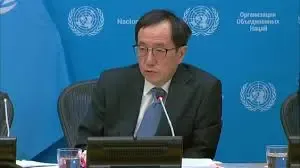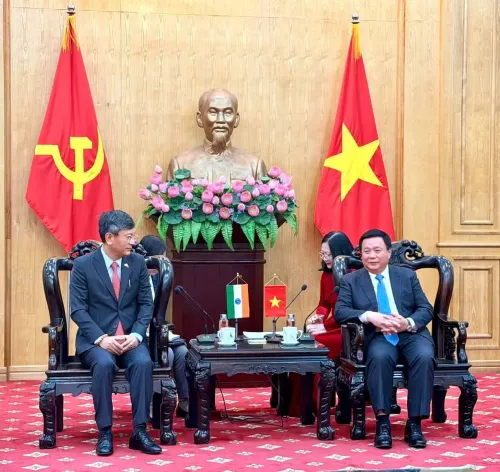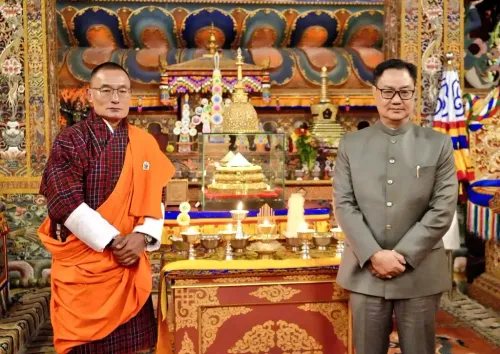Is Japan Responding to China's 'Unfounded' Claims on Takaichi's Taiwan Comments?

Synopsis
Key Takeaways
- Japan's UN representative refutes China's claims on Takaichi's Taiwan comments.
- China's accusations deemed factually incorrect.
- Japan emphasizes its commitment to international law.
- Concerns raised over military expansion by certain nations.
- Japan's defense policy is focused on passive defense.
Tokyo, Nov 25 (NationPress) Japan's Permanent Representative to the United Nations, Yamazaki Kazuyuki, has reached out to UN Secretary-General Antonio Guterres, declaring that China's grievances regarding Japanese Prime Minister Sanae Takaichi's statements about Taiwan are factually incorrect and unfounded.
This correspondence follows a stern protest from Beijing concerning Takaichi's comments made during a parliamentary committee session on November 7, where she indicated that a military offensive against Taiwan could lead to a survival-threatening situation for Japan, suggesting a possible involvement of the Japanese Self-Defence Forces.
In his letter to the UN chief, Kazuyuki stated, "I acknowledge that the Permanent Representative of China recently sent a correspondence regarding Japan to your Excellency, which was then disseminated to the Permanent Missions of all United Nations Member States. The claims made by China in that letter seem to contradict the facts and lack substantiation, which leads me to respectfully present this letter in response, as instructed by the Japanese Government."
"As you are aware, Japan has consistently fostered peace and prosperity in the international community since the conclusion of World War II. Japan has always adhered to and respected international law, including the UN Charter, and is actively involved in upholding and enhancing a free and open international order based on the rule of law globally," he continued.
Expressing his concerns, the Japanese envoy pointed out that some nations today are expanding their military capabilities without transparency.
He remarked that there are countries that continue to try to effect unilateral changes to the status quo through coercive means, despite objections from neighboring nations.
"Japan opposes such actions and distances itself from them. Our fundamental defense policy is a passive defense strategy focused solely on defense, which contradicts the claims made by the Chinese side," the letter emphasized.
"Japan also delineates, through domestic legislation, the circumstances under which the right of collective self-defense acknowledged under the UN Charter can be exercised, in a restrictive manner. The statements made by Prime Minister Sanae Takaichi, as referenced by the Chinese side, are in line with this stance. Hence, China's assertion that Japan would exercise self-defense rights without an armed attack is erroneous," it further clarified.
Additionally, according to reports from Japan's Kyodo News, Japanese Vice Foreign Minister Takehiro Funakoshi met with Chinese Ambassador Wu Jianghao in Tokyo on Tuesday to deliberate on this matter.









